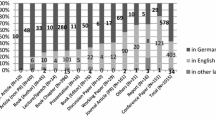Abstract
This study applies a method of author co-citation analysis to examine the intellectual structure of political communication study. Fifty one influential authors were selected from active members of the Political Communication Divisions of the International Communication Association (ICA), the National Communication Association (NCA), and the American Political Science Association (APSA). The results of the multidimensional scaling analysis and cluster analysis of these 51 selected authors' co-citation patterns show that intellectual fragmentation exists in political communication research; scholars with different academic backgrounds exhibit specialties using particular research approaches to study certain subjects in the field; scholars do not have much information exchange, and thus they are intellectually separate and confined within the boundaries of each fragment. The findings of this quantitative study complements and cross-validates the assessment made by other traditional qualitative reviews about the field.
Similar content being viewed by others
References
P. Van Den Besselaar, L. Leydesdorff, Tracking change in the structure of communication networks. (Dutch) In: Proc. 2nd Dutch Information Science Conference. Leiden: Stinfon, 1992.
L. Leydesdorff, P. Van Den Besselaar, Scientometrics and Communication Theory: Towards Theoretically Informed Indicators. Scientometrics, 38 (1997) 155–174.
R. S. Burt, Towards a structural theory of action. London: Academic Press, 1982.
M. Granovetter, The strength of weak ties. American Journal of Sociology, (1973) 1360–1380.
P. Van Den Besselaar, L. Leydesdorff, Mapping change in scientific specialties; a scientometric case study of the development of artificial intelligence. Journal of the American Society of Information Science, 47 (1996) 415–436.
L. Leydesdorff, The relations between qualitative theory and scientometric methods in S&T studies. Scientometrics, 15 (1989) 333–347.
P. Wouters, L. Leydesdorff, Has Price's Dream come through? Scientometrics, 31 (1994) 193–222.
D. Knoke, J. H. Kuklinsky, Network analysis. Beverly Hills: Sage, 1982.
P. Wouters, The citation culture. PhD thesis, University of Amsterdam, 1999.
E. Noyons, Mapping of Scientometrics, Informetrics, Bibliometrics. (http://sahara.fsw.leidenuniv.nl/ed/sib/home.html)
S. Bhattacharya, P. K. Basu, Mapping a research area at the micro level using co-word analysis. Scientometrics, 43 (1998) 359–372.
Author information
Authors and Affiliations
Rights and permissions
About this article
Cite this article
Lin, Y., Kaid, L.L. Fragmentation of the Intellectual Structure of Political Communication Study: Some Empirical Evidence. Scientometrics 47, 143–164 (2000). https://doi.org/10.1023/A:1005678011835
Issue Date:
DOI: https://doi.org/10.1023/A:1005678011835




